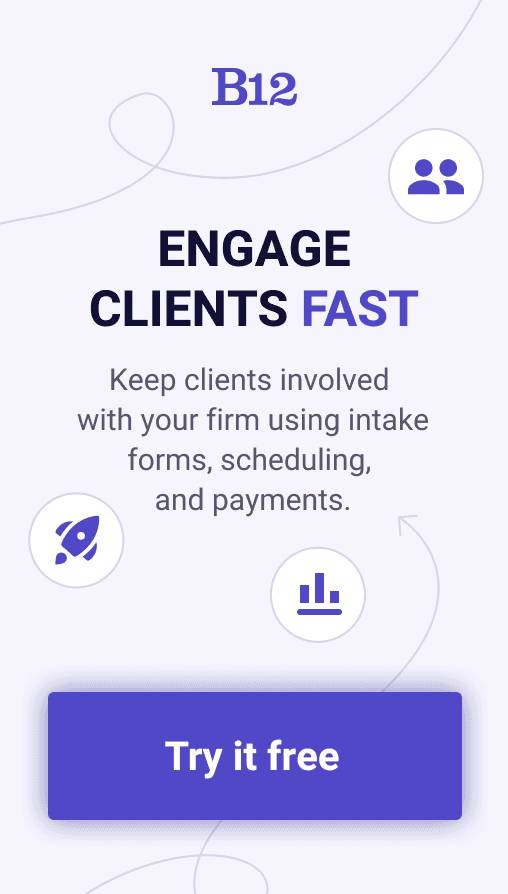Build an AI website in 60 seconds
AI generates your personalized website instantly with built-in scheduling, payments, email marketing, and more.
Start for free
Effective ways to build rapport with clients

Relationship building goes beyond just connecting with clients. Creating an atmosphere of trust, understanding, and mutual respect is key. Clients who feel comfortable working with you are more likely to become loyal customers who refer others to your business when you have a strong rapport. It takes time and effort to build this rapport.
The tips and techniques in this blog will help you build lasting customer relationships and enhance your career. Let’s dive in!
The importance of rapport in client relationships
A strong client relationship starts with rapport. A rapport is a sense of mutual understanding, respect, and trust between two people. In other words, it's the harmonious connection, understanding, and trust between two or more people.
It's easier to communicate and cooperate when you have a rapport with a client. For a positive client experience and successful outcomes, it's crucial. Clients who feel a strong rapport with their service provider are more likely to communicate their needs and expectations openly, resulting in a deeper understanding. You can't effectively communicate or meet clients' needs and expectations without rapport.
To build client rapport, you need empathy, active listening, and open communication. So, what makes rapport so crucial in client relationships? Let's explore this further below.
Having a good rapport with clients makes it easier to communicate and collaborate. If clients feel like they can trust a service provider, they're more likely to trust their expertise. As a result of this trust, businesses can gain valuable insight into their clients' business needs. In addition, rapport fosters a comfortable environment where clients feel heard and understood, which leads to stronger relationships.
Effective communication techniques
Communication is key to building a rapport with clients. You can strengthen your connection with clients by using specific techniques. Engaging your clients and giving them your undivided attention is an essential part of effective communication. Communicating clearly and accurately requires verbal and nonverbal communication. Maintaining eye contact and paying attention to your tone of voice can help you improve your communication skills and build rapport with clients.
Active listening
Active listening is a fundamental communication skill that fosters rapport with clients. It involves fully concentrating on what the client is saying, understanding their message, and responding appropriately. Active listening shows clients that their opinions and concerns are valued, enabling them to feel heard and understood. This technique helps build trust and encourages open and productive dialogue throughout the client relationship.
Verbal and nonverbal communication
Besides active listening, effective verbal and nonverbal communication is key to building rapport. Using clear and concise language, maintaining eye contact, and adopting open and friendly body language help convey attentiveness and sincerity. Similarly, using an appropriate tone of voice that reflects empathy and professionalism can make clients feel more comfortable and appreciated.
Service providers can foster a positive customer service experience by incorporating these communication techniques.
Establish rapport through honesty, reliability, and transparency
Trust is key to building long-lasting relationships with clients. If clients feel like they can trust you, they're more likely to open up. Here's how to build trust with your clients.
Creating a positive and supportive environment
Building rapport with clients requires more than just effective communication. By demonstrating empathy towards your clients, you'll be able to connect with them on a deeper level, understanding their emotions, challenges, and perspectives. This empathy fosters trust and strengthens the client relationship.
A positive environment is built on honesty, reliability, and transparency. It's important that your clients trust you to follow through on your commitments. Creating a supportive environment will strengthen your rapport with clients.
Understanding clients' perspectives
Demonstrating empathy is essential to building rapport with clients. Take the time to understand their emotions and perspectives, and show genuine concern for their challenges and goals. By putting yourself in their shoes, you can better address their needs and provide personalized solutions. Empathy helps create a supportive environment where clients feel heard and valued.
Addressing clients' concerns and needs promptly
Trust is also built by being responsive. Make sure you answer clients' questions and concerns quickly. You show your commitment to their satisfaction by prioritizing their needs. Promptly addressing their needs helps strengthen rapport by fostering a sense of reliability and dependability. Being responsive shows that you value your clients' time and prioritize their needs, whether it's answering emails promptly, returning customer calls within a reasonable timeframe, or offering assistance when needed.
Demonstrating honesty, reliability, and transparency
Clients value honesty, reliability, and transparency in their professional relationships. Be honest and open in all your communications. Make realistic claims and don't overpromise, since these can lead to disappointment. Set realistic expectations and establish trust from the start by being transparent about what you can and can't deliver.
With these strategies, you can build trust and rapport with your clients, leading to stronger relationships. Don't forget: building trust takes time and effort.
Tailoring your approach to individual clients
Recognizing and adapting to different communication styles
Building rapport with clients requires understanding and acknowledging their unique communication styles. People have different preferences when it comes to how they get and process information. Some clients prefer direct, concise communication, while others like more detailed explanations. By recognizing these differences, you can tailor your approach to ensure effective communication and connection.
Offering personalized experiences and added value
Building long-term relationships with clients means going above and beyond their expectations. Provide personalized experiences for each client. Offer added value by identifying their specific needs and providing relevant resources, recommendations, or insights. It shows your commitment to their success and reinforces the bond of trust you've built.
Using follow-ups and periodic check-ins
Regular communication is crucial for maintaining rapport with clients. Following up after a completed project or periodically checking in to see how they're doing not only shows your genuine interest in their success but also reinforces the relationship. These follow-ups can include sending personalized messages, offering relevant updates, or scheduling brief catch-up calls. Staying in touch demonstrates your commitment to their ongoing satisfaction, helping to solidify the bond you have established.
Building long-term rapport
Building long-term rapport with clients is crucial for establishing strong and lasting relationships. By going the extra mile and offering personalized experiences, you can leave a lasting impression and show your clients that their satisfaction and success are your top priorities.
Adding value and providing personalized service
One way to build long-term rapport is by offering personalized experiences and going above and beyond your clients' expectations. Whether it's remembering important milestones or preferences, or tailoring your services to meet their unique needs, personalization demonstrates that you truly care about their individual goals and interests. By providing added value through customized solutions, recommendations, or surprises, you establish yourself as a trusted partner who is dedicated to their success.
Checking in regularly
Maintaining regular communication plays a significant role in building long-term rapport with clients. By reaching out proactively, you demonstrate your commitment to their satisfaction and the success of your ongoing relationship. These touchpoints also allow for ongoing collaboration and feedback, ensuring you remain connected to your clients continuously.
Demonstrating consistency and reliability
Consistency and reliability are key pillars in building long-term rapport with clients. By consistently delivering on your promises, meeting deadlines, and providing a high level of service, you establish trust and dependability. Your clients should feel confident knowing that they can rely on you to fulfill their needs and expectations consistently. Being consistent and reliable forms a strong foundation for building a lasting rapport that promotes loyalty and satisfaction.
Nurturing the relationship over time
Building long-term rapport goes beyond the initial interactions. It requires ongoing nurturing of the relationship. Regularly reaching out to your clients to check on their progress, celebrate successes, and address any concerns or challenges will help strengthen the bond you have established. By fostering a sense of partnership and demonstrating that you are invested in their long-term success, you develop rapport that extends far beyond a single transaction or project.
By incorporating these strategies into your interactions with clients, you can build rapport that is not only strong but also long-lasting. Going the extra mile, staying in touch, demonstrating consistency and reliability, and nurturing the relationship over time are all essential components of fostering a successful and enduring partnership with your clients. Remember, establishing rapport is an ongoing process that requires continuous effort and attention, but the rewards are well worth it.
Build better client relationships with a consistent online presence
You can’t expect to build rapport with your clients if you’re unavailable to them. With an impressive online presence, you can ensure that potential and existing customers can contact you anytime, anywhere.
Need a professional online presence for your business? Try B12 today to get a website built by AI and refined by expert designers, copywriters, and SEO specialists. Make DIY changes any time you want. Launch in 30 days or less with client-engaging tools like scheduling and payments. Sign up for free today.
Attract, win, and serve more clients
Receive helpful resources directly to your inbox to help you succeed online.
Draft your site in 60 seconds
Get an AI website made specifically for you that's free to launch.
Start for free ✨No credit card required
Spend less time on your website and more time growing your business
Let B12 set up your professional online presence with everything you need to attract, win, and serve clients.





